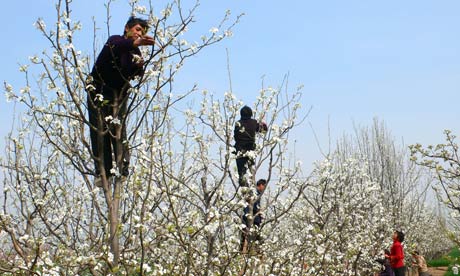a year of continued and frightening environmental degradation and the looming prospect of severe food shortages in years to come. It is the image of workers in the Maoxian county of Sichuan, China, an area that has lost its pollinators through the indiscriminate use of pesticides and the over-harvesting of its honey. These workers aren’t picking fruit, or digging, or planting. They’re pollinating pear and apple trees by hand. In this part of China, the honeybee has been replaced by the human bee.
I learned about this startling practice this year, but in fact its been going on for the past two decades. Every spring, thousands of villagers climb through fruit trees hand-pollinating blossoms by dipping “pollination sticks” (brushes made of chicken feathers and cigarette filters) into plastic bottles of pollen and then touching them against each of the tree’s billions of blossoms.
One-third of all our food staples only grow after pollination. In the United States alone, the cost of replacing this “free service” which nature has provided for hundreds of thousands of years, is put at anything between £14bn and £92bn. And that’s in one country alone. If we don’t wake up to the global crisis facing our pollinators, the banking crisis is going to look relatively trivial as the world runs out of food. China can, for the time being, afford to hurl this level of human labour at the problem: but short of the prospect of actual starvation, it is wholly unrealistic to imagine this happening in, say, California, where bees still pollinate orange, apple, pear and plum trees.
